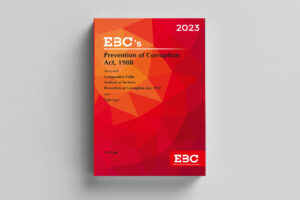Delhi High Court: In a petition filed under Section 482 of the Bharatiya Nagarik Suraksha Sanhita, 2023 seeking grant of anticipatory bail in FIR registered for the offences under Section 61(2) of Bharatiya Nyaya Sanhita, 2023 and Sections 7, 8, 9, 10 and 12 of Prevention of Corruption Act, 1988 (‘PC Act’), Shalinder Kaur, J.*, stated that undoubtedly, the allegations of corruption must be dealt with zero tolerance. When, during a trap proceeding, further information was received about the offence/offenders, the CBI could not be rendered helpless in proceeding with further investigations.
The Court stated that the nature and gravity of the alleged offence, prima facie, showed that the allegation against the petitioner could not be lightly brushed aside at this stage. Accordingly, the Court dismissed the petitioner’s application for the grant of anticipatory bail.
Background
The petitioner was a public servant, who joined Government Service in 1995 and was presently serving as Senior Section Engineer (Tender Section) (‘SSE’) with the Northern Railways, New Delhi.
The prosecution stated that the Senior Divisional Electrical Engineer (General) (‘Sr. DEE’), the petitioner, and SSE, Electrical-G Branch, were engaged in corrupt and unlawful practices in the matter of issuance of work orders and clearance of bills relating to private contractors, in lieu of illegal gratification. It was also alleged that the petitioner was actively involved in the collection of bribes from various railway contractors, both for himself and on behalf of Sr. DEE, in exchange for awarding work orders and facilitating clearance of bills.
The CBI, acting upon the source information, had laid a trap on 6-4-2025 and arrested few persons, Delhi, while the bribe amount was being exchanged. On the same day, a raid was conducted at the petitioner’s premises. During the said search, an amount of Rs.7,85,000 in cash and gold valued at Rs. 43.06 lakhs were recovered. The petitioner was not present at his residence during the raid and the intercepted calls revealed that the petitioner, upon receiving information about the raid, instructed his brother to obstruct the search proceedings.
As per the respondent, the petitioner was sufficiently aware of the investigation and thus, he called his brother and directed him to prevent the CBI from conducting the search, and in case the search ensued, he instructed him to remove all the things.
Further, on the next day, i.e. 7-4-2025, the petitioner, along with his wife, operated their bank locker, raising frivolous ground, that marriage of the daughter/nephew of the petitioner was to take place, without giving the date or place of such an event. More so, when it was in the petitioner’s knowledge that a raid was conducted at his premises, it was imperative upon him not to operate the bank locker.
The Special Public Prosecutor submitted that there were 194 intercepted calls, which revealed incriminating conversation involving the petitioner in negotiations and distribution of illegal gains. Thus, a larger conspiracy was to be unearthed, for which the custodial interrogation was needed. He submits that the provision of Section 17A of the PC Act was not applicable in the present matter as it was a trap case and three accused persons were arrested and at that time. However, the petitioner was not available.
Whereas, the petitioner contended that the co-accused persons were arrested pursuant to a trap laid by the CBI on 6-04-2025, prior to registration of the FIR i.e. during the Enquiry without the sanction under Section 17A of the PC Act, which mandatorily required prior sanction for purpose of enquiry or Investigation with respect to a public servant. However, the petitioner was not arrested pursuant to a trap laid by the CBI. It was further contended that the respondents had, in effect, proceeded for interception of calls without any authorization and to conduct an enquiry without obtaining the prior approval of the Competent Authority.
Analysis, Law, and Decision
The Court observed that as per the prosecution’s version, the role assigned to the petitioner was that he was collecting and distributing the bribe amount amongst various stakeholders. He was instrumental in converting the bribes received by the accused into gold with the help of accused Saket Kumar, Director of Shivmani Enterprises Pvt. Ltd.
The Court stated that undoubtedly, the allegations of corruption must be dealt with zero tolerance. When, during a trap proceeding, further information was received about the offence/offenders, the CBI could not be rendered helpless in proceeding with further investigations.
The Court stated that in the present case, the manner in which the petitioner, despite having knowledge of the raid being conducted at his premises, evaded participation in the investigation and gave instructions to prevent the raid and for disappearance of evidence, and also operated his bank locker the very next day, showed his mala fides. Further, undisputedly, the petitioner’s son despite being served a notice, did not handover the key to the bank locker to the CBI. The details of other intercepted calls prima facie also pointed towards the petitioner’s involvement.
The Court stated that the nature and gravity of the alleged offence, prima facie, showed that the allegation against the petitioner could not be lightly brushed aside at this stage. Thus, the Court dismissed the present petition for the grant of anticipatory bail. The Court clarified that any observation made in the present case, should not be tantamount to be an expression on the merits of the case and had been made for the consideration of the anticipatory bail application alone in the prevailing circumstances.
[Arun Kumar Jindal v. CBI, 2025 SCC OnLine Del 3026, decided on 9-5-2025]
*Judgment authored by- Justice Shalinder Kaur
Advocates who appeared in this case:
For the Petitioner: Nandita Rao, Senior Advocate with Sheezan Hashmi, Akshat Kumar, Sirhaan Seth, Surya Pratap Singh, Adesh Kumar Choudhary, Shubham Raj Anand and Amit Peswani, Advocates.
For the Respondent: Ravi Sharma, SPP with Swapnil Choudhary, Ishann Bhardwaj and Shivam Prasad, Advocates.


